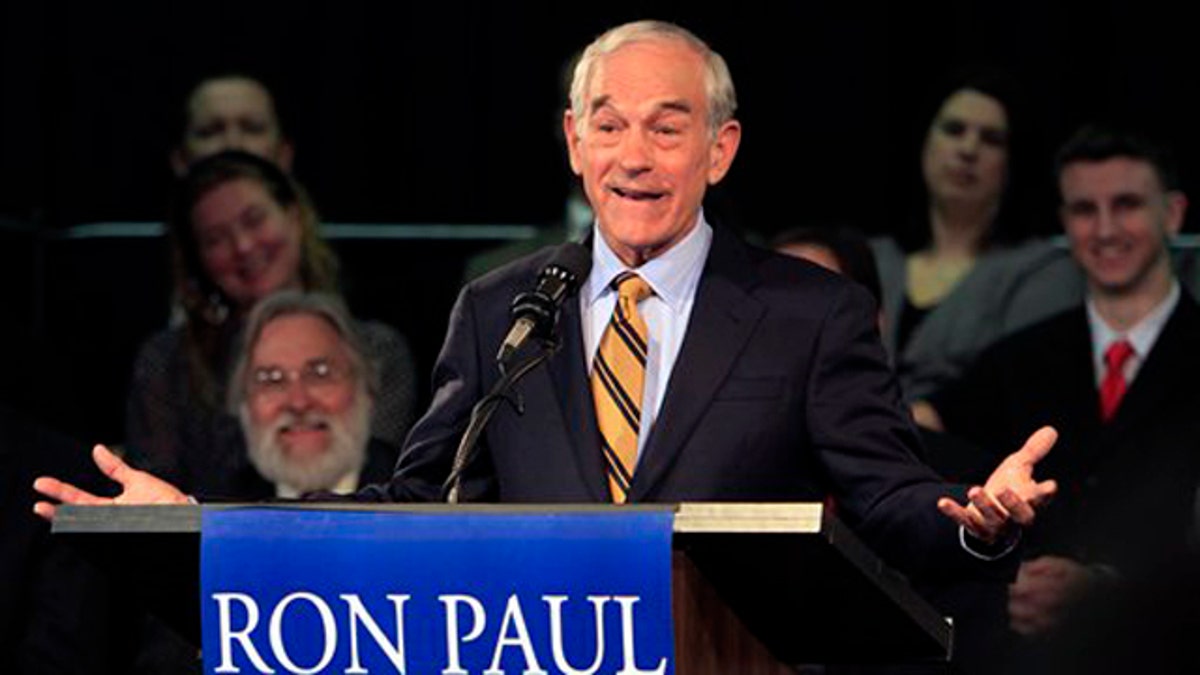
May 13: Rep. Ron Paul gives a speech after announcing his plans to seek the Republican nomination for president in Exeter, N.H. (AP)
Politics makes for strange bedfellows. Add Code Pink and Republican Rep. Ron Paul to that list.
The vehemently anti-war group is organizing a slew of events this weekend in opposition to the United States' Israel policy, to coincide with the annual conference of the American Israel Public Affairs Committee. Ahead of the protests, a Code Pink activist suggested the group -- at least when it comes to Israel -- is actually on the same page as Paul, a libertarian and one of the first candidates to enter the race for the GOP presidential nomination.
"The Ron Paul people are closer and closer to our talking points with each election," Code Pink activist Liz Hourican told FoxNews.com.
Hourican specifically was referring to Paul's and Code Pink's respective positions on U.S. aid to Israel -- both have called for eliminating it. Code Pink, known for staging noisy disruptions at hearings and speeches where their topics of interest are being discussed, shares other common ground with Paul, like opposition to the Afghanistan and Iraq wars. But the Israel issue added a new layer.
Paul spokeswoman Rachel Mills, asked about the Code Pink comment, suggested Code Pink might be gravitating toward the congressman's view, rather than the other way around.
"He certainly doesn't take any talking points from Code Pink," she said. "If they're getting closer to his view that's one thing, but he's certainly not looking to them for policy information."
Asked whether Paul would consider linking up with the anti-war group in the future, she said Paul is "in favor of coalition building," noting that his views occasionally put him in the same camp as Democrats like anti-war Rep. Dennis Kucinich, D-Ohio. But she said any cooperation would have to be "issue-specific."
Paul has been out in front on the Israel aid issue. Earlier this year, he offered an amendment to cut off $6 billion in U.S. aid to Israel and three other countries, including Pakistan. The amendment died, though Mills said the congressman would consider reintroducing it if there's an opportunity. Paul's son, Kentucky GOP Sen. Rand Paul, also tried pushing a plan to cut U.S. foreign aid, including the $3 billion slated for military assistance to Israel.
The elder Paul reiterated his concerns about U.S. support for Israel during the first 2012 Republican primary debate, hosted by Fox News and the South Carolina Republican Party. During the debate, Paul said Israel has "become too dependent on us."
He added: "But I don't want any of this foreign aid -- Pakistan or anybody else -- because the principle is wrong and because it doesn't achieve anything. ... It's not like 100 percent of the people in Israel or every Jew in this country believes that we should have the foreign policy that we have."
The view on Israel aid is not widely held in the Republican Party. U.S. administrations of both parties have long backed U.S. support for Israel, and the military aid levels were most recently pledged in an agreement between the two countries several years ago.
Shortly before Paul officially announced his candidacy last week, the Republican Jewish Coalition put out a statement saying it was "deeply concerned" about Paul's Israel positions.
"While Rep. Paul plans to run as a Republican, his views and past record place him far outside of the Republican mainstream," RJC Executive Director Matthew Brooks said. "Throughout his public service, Paul has espoused a dangerous isolationist vision for the U.S. and our role in the world. He has been a virulent and harsh critic of Israel during his tenure in Congress."
Josh Block, a former American Israel Public Affairs Committee spokesman, also noted that Americans are generally pro-Israel because of the two countries’ common values and shared side in the fight against terror.
“Folks calling to cut off our relationship and security assistance to Israel are way out on the fringe of real thought, and that includes Ron Paul,” Block said.
But Paul's position will certainly get an airing this weekend, as Code Pink and dozens of other groups plan demonstrations and summits in Washington, protesting Israeli Prime Minister Benjamin Netanyahu's visit and the AIPAC conference, where President Obama is expected to speak.
Hourican said Obama has failed at trying to salvage a Mideast peace process.
"This foreign policy of the U.S., and I love this country, is just not working," she said.
She called for stripping aid to Israel, saying: "We need our money here."




